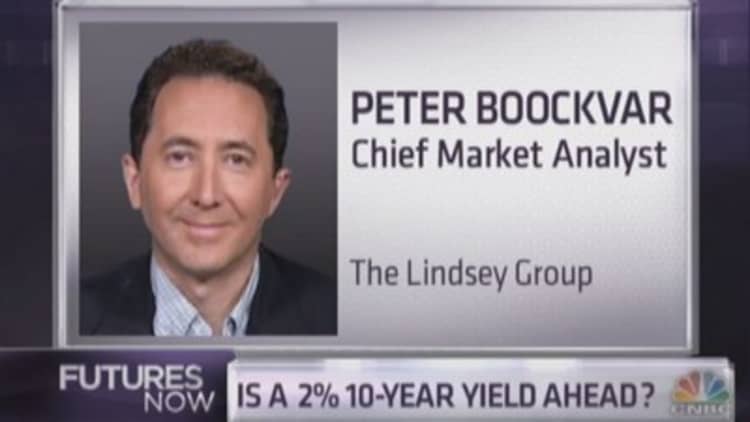
After three tough years for gold, could a bullion turnaround finally be in the cards?
That's the argument made by Lindsey Group's chief market analyst, Peter Boockvar, who says that the Federal Reserve meeting minutes released this week point to a reversal for the precious metal.
"The three-year bear market in gold, in my opinion, is over, because yesterday in their minutes, the Fed officially threw their hat in the global-currency-war ring," Boockvar said Thursday on CNBC's "Futures Now."
Read More Behind the Trade: Buy gold now, trader says
Boockvar refers to the unease that Federal Open Market Committee officials voiced about the dollar's strength against foreign currencies.
"Some participants expressed concern that the persistent shortfall of economic growth and inflation in the euro area could have adverse effects on the U.S. external sector. ... A couple of participants pointed out that the appreciation of the dollar might also tend to slow the gradual increase of inflation toward the FOMC's 2 percent goal," the minutes record.
Boockvar's interpretation is that after standing by and watching a bevy of central banks around the world take measures (lingual or market-based) to reduce the level of their currencies, "the Fed finally decided, 'You know what? I want to be part of this battle.' And to me, that's the last missing piece in the gold bull case in the context of a three-year bear market."
It's been a wild ride for gold prices, which rose from about $800 per troy ounce in September 2008 to above $1,900 in three years—only to lose $700 worth of value in the ensuing three years. Thus far, expectations that the Fed's actions would lead to massive inflation have simply not panned out, with deflation often being the bigger concern.
Since many investors held gold in order to hedge against inflation, and many placed bets on gold because they expected that Fed actions would end up causing massive inflation, gold prices have slid hard as worst-case-scenario predictions have not played out.
And naturally, many take the other side of Boockvar in arguing that the slide is not yet over.
"I don't know how you can make a bullish case for gold," said Edward Meir, metals analyst with INTL FCStone. "The U.S. economy is the only one that's growing right now, which means the dollar is going to continue to move up, and that should be bearish for gold. People won't buy if they see prices coming down. Jewelry demand and investment demand are lackluster. And forget inflation—there hasn't been any inflation for 20 years."
"Oh, and the charts look horrible," Meir added. "it's going to $900."
Meir discounts the possibility that the Fed told us anything new in its minutes. But even those who are more sympathetic to Boockvar's argument that inflation is coming don't necessarily advocate jumping onto bullion right now.
RBC precious metals analyst George Gero, for one, acknowledges that rising labor costs as a result of an improving job market could bring "inflationary winds." But he says that "whether we're going to bring the funds back into gold for asset allocation remains to be seen."
In fact, he points out that gold open interest has fallen on the recent increase in prices, indicating that we are seeing more short covering than fresh buying.
"We have almost as many pluses as we have minuses right now—so we're in a very delicate technical position," Gero said.
Watch "Futures Now" Tuesdays and Thursdays 1 p.m. ET exclusively on FuturesNow.CNBC.com!



